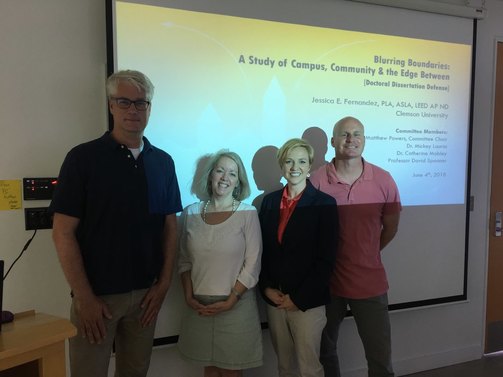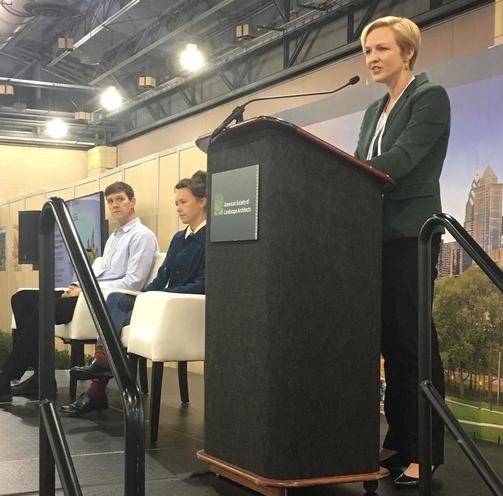Research.
|
Research is, in the broadest sense, how we garner and test information to answer a question that solves a problem. During my years practicing full time as a landscape architect and campus planner, there were many challenges which afflicted the decisions I made on a regular basis. However, my goal as a practitioner was not to create knowledge, and I often found myself following the trends of the industry to inform choices which impacted the built environment. My decision to shift professionally to the academic realm was, in part, based upon my desire to learn and to share knowledge in ways that are helpful to the future of the field of landscape architecture. In this way, I am able to provide empirically-based evidence that can appropriately and responsibly inform the future shape of our landscape fabric. Continuing my professional specialization in campus planning and sustainable urban design, my research interests tie human interaction, perception, and activity to the physical built environment. My research agenda includes current and future exploration of the following:
The implications of these research interests range from the creation of best practices during the design and planning process for improvement of social and physical environments, to bringing cutting edge research approaches such as the use of big data further into the realm of landscape architecture, to normalizing the use of virtual reality and other technologies in the design industry. The common thread that ties these interests together is the indubitable connection between people, place, and the environment in the practice of landscape architecture. My research has been presented widely at ASLA, CELA, EDRA, and IMCL national conferences, and published through various peer-reviewed journals and other research platforms. |
Recent Peer-Reviewed Publications:
Fernandez, J., Song, Y., Rezaeimalek, S., Melcher, K., Longnecker, D. (2023). Exploring rural community place assessment through mobility and social media data in Ft. Gaines, Georgia. Regional Science, Policy and Practice. DOI: 10.1111/rsp3.12655
Liu, P., Liu, J., Fernandez, J., Zou, Q., Lin, M. (2023). Positive emotions and natural landscape in virtual reality: A systematic review comparing interventions, measures, and outcomes. Journal of Environmental Psychology. DOI: 10.1016/j.jenvp.2023.102011
Song, Y., Wang, R., Lu, H., Fernandez, J., Wang, T. (2023). Why do we love the high line? A case study of understanding long-term user experiences of urban greenways. Computational Urban Science, 3(18). DOI: 10.1007/s43762-023-00093-y
Fernandez, J., Song, Y., Padua, M., Liu, P. (2022). A framework for urban parks: Using social media data to assess Bryant Park, New York. Landscape Journal, 41(1):15-29. DOI: 10.3368/lj.41.1.15
George, B., Fernandez, J., Summerlin, P. (2022). The impact of virtual reality on student design decisions: Assessing density and proximity when designing in virtual reality versus traditional analog processes. Landscape Journal 41(1): 31-44. DOI: 10.3368/lj.41.1.31
Longnecker, D., Jones, T., Fernandez, J., Spooner, D. (2021). Perspectives on documentation standards in design education: A strategic approach to AutoCAD implementation. Landscape Research Record, 10, 1-15.
Song, Y., Wang, R., Fernandez, J., Li, D. (2021). Investigating sense of place of the Las Vegas strip using online reviews and machine learning approaches. Landscape and Urban Planning, 205(2021): 1-12 . First published in 2020. DOI: 10.1016/j.landurbplan.2020.103956
Song, Y., Fernandez, J., & Wang, T. (2020). Understanding perceived site qualities and experiences of urban public spaces: A case study of social media reviews in Bryant Park, New York City. Sustainability, 12(19), 8036. DOI: 10.3390/su12198036
Fernandez, J. & Powers, M. (2020). Before the neo-liberal campus: University, place, and the business of higher education. Architecture and Culture, 9(1), 25-44. DOI: 10.1080/20507828.2020.1805949
Fernandez, J., Song, Y., Rezaeimalek, S., Melcher, K., Longnecker, D. (2023). Exploring rural community place assessment through mobility and social media data in Ft. Gaines, Georgia. Regional Science, Policy and Practice. DOI: 10.1111/rsp3.12655
Liu, P., Liu, J., Fernandez, J., Zou, Q., Lin, M. (2023). Positive emotions and natural landscape in virtual reality: A systematic review comparing interventions, measures, and outcomes. Journal of Environmental Psychology. DOI: 10.1016/j.jenvp.2023.102011
Song, Y., Wang, R., Lu, H., Fernandez, J., Wang, T. (2023). Why do we love the high line? A case study of understanding long-term user experiences of urban greenways. Computational Urban Science, 3(18). DOI: 10.1007/s43762-023-00093-y
Fernandez, J., Song, Y., Padua, M., Liu, P. (2022). A framework for urban parks: Using social media data to assess Bryant Park, New York. Landscape Journal, 41(1):15-29. DOI: 10.3368/lj.41.1.15
George, B., Fernandez, J., Summerlin, P. (2022). The impact of virtual reality on student design decisions: Assessing density and proximity when designing in virtual reality versus traditional analog processes. Landscape Journal 41(1): 31-44. DOI: 10.3368/lj.41.1.31
Longnecker, D., Jones, T., Fernandez, J., Spooner, D. (2021). Perspectives on documentation standards in design education: A strategic approach to AutoCAD implementation. Landscape Research Record, 10, 1-15.
Song, Y., Wang, R., Fernandez, J., Li, D. (2021). Investigating sense of place of the Las Vegas strip using online reviews and machine learning approaches. Landscape and Urban Planning, 205(2021): 1-12 . First published in 2020. DOI: 10.1016/j.landurbplan.2020.103956
Song, Y., Fernandez, J., & Wang, T. (2020). Understanding perceived site qualities and experiences of urban public spaces: A case study of social media reviews in Bryant Park, New York City. Sustainability, 12(19), 8036. DOI: 10.3390/su12198036
Fernandez, J. & Powers, M. (2020). Before the neo-liberal campus: University, place, and the business of higher education. Architecture and Culture, 9(1), 25-44. DOI: 10.1080/20507828.2020.1805949


